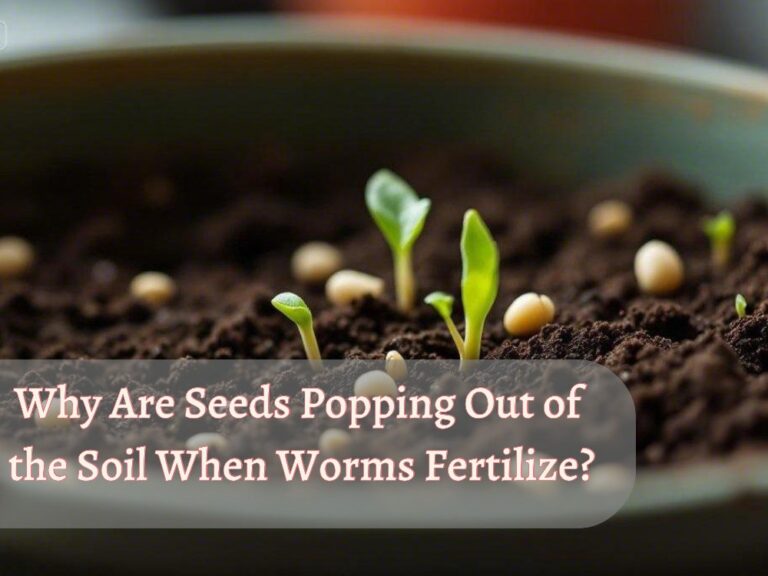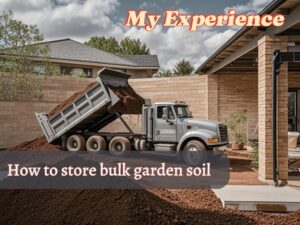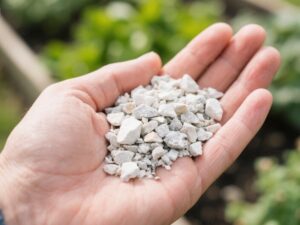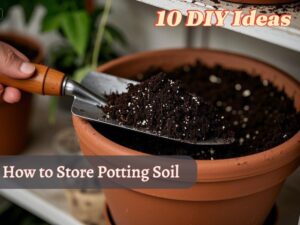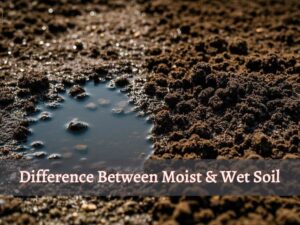Have you ever considered why seeds pop out from the soil, especially when you add worm casting or earthworms are already present?
Some gardeners believed it natural, while some agreed it was a problem.
So, is this really happening due to the movement of the worms, or are there other factors behind it? Let’s understand this concept in detail so that you can know whether seeds popping out from the soil is normal or if something should be done about it.
Have you bought bulk soil for your garden? Good know here how to store it safely!
- Why Seeds Are Popping Out From The Soil When Worms Move? Are Other Factors Can be Involved?
- Is it Normal to Pop out of seeds from the soil?
- What to Do If More Seeds Are Popping Out Constantly and Frequently
- Final Thoughts: Why Seeds are popping out of the soil through worms fertilizing and How to control them Wisely
Why Seeds Are Popping Out From The Soil When Worms Move? Are Other Factors Can be Involved?

Worms move in the soil in specific ways that can affect seed placement; especially earthworms are experts in making tunnels in the soil.
Seeds can pop out from the soil due to worms’ movement. This movement can be for some reasons including;
When Seeds are pop out after worms fertilization?
1-Loosening the Soil
During digging and moving, worms push the soil back with their bodies, creating a vacuum in it.
This pushes seeds upward, especially if the seeds are already close to the surface.
As a result, the tunnels are formed, the topsoil is shaken, and the seeds can come out.
2-Digesting Organic Matter
Worms do not eat compost or mulch or any other food scraps directly but rather the bacteria that grow on it after the decomposition; they can pull organic material into their tunnels, which can also move seeds during this digging.
So it is possible that movement in the soil can move seeds up, but the real reason for this is not their eating process but their movement and soil changes.
Do you know? Earthworms are also called Soil Engineers. Because they tunnel into the soil to improve aeration and water permeability, digest organic matter, and export nutrient-rich worm castings, making the soil structure soft and fertile.
3-Soil Type
The soil type (in which worms move) also matters.
- Loamy, sandy, or loose soil is commonly soft, allowing particles to drive easily, so the tunneling activity of worms lifts the seeds up.
- Soil with rich, organic matter content is also lighter and can affect seed displacement.
- In clayey and heavy soil, seeds move less, but they can come out if the soil absorbs too much moisture and expands or contracts.
4-Humidity Change
Changes in humidity levels also affect worms’ movement in the soil.
They are active in higher humidity and create tunnels to loosen the soil, allowing light seeds (such as seeds of lettuce, tomatoes, etc.) to come out the surface.
On the other hand, if your garden soil was moist before but dries out due to lack of water, the worms that were previously there will move in search of moisture, causing seeds to shake and pop out of the soil.
Worm movement can not occur without factors such as soil type (loamy and loose soil), humidity changes (higher humidity), and the digging process of the worms.
Can Seeds Pop Out Without Worms?
Yes, It can often with light seeds that can move up due to common soil changes and other environmental influences, such as;
1-Water and Rain
During heavy rain, water droplets push the soil, especially in sandy and light soils, where light seeds can easily come up off the surface.
On the other hand, the overwatering softness of the soil can become even looser with the worms’ movement, causing the seeds to leave their space.
Do you know? Waterflow can also wash away seeds, especially if the ground is slightly slopping with poor drainage.
2-Strong wind and Other Insects
Strong winds can bring light seeds to the surface, particularly when the soil is soft, loose, light, and not fully settled with dryness.
Additionally, ants and other insects sometimes carry seeds out as food, which can cause the seed’ displacement.
3-Sowing seeds at the wrong depth
If seeds are sown too shallowly, they can easily float to the top of the soil. This often happens in loose or sandy soil that can not hold the seed firmly.
And when rainwater falls quickly or worms move through the soil, shallow seeds can easily be dislodged.
Is it Normal to Pop out of seeds from the soil?
By the way, popping out of seeds due to worms can be a natural process, but it is not always;
When is it normal?
If a few seeds (especially light seeds) come up to the soil surface due to little worm activity, don’t panic! It may be a part of the soil’s natural fertility and micromovement.
Having more worms in the soil usually is a sign of healthy soil because they improve air circulation through their digging process.
Even though some seeds come out sometimes, most can re-establish themselves in the soil or grow.
When is it unusual?
If your planted seeds are constantly coming out, it may be an indication that the soil is too soft and loose. Excessive worm activity can bring the seeds up.
Frequently, seeds popping out can affect seed germination and crop growth, especially if they dry out or are eaten by wildlife.
Discover the 10 reasons why your plants are not thriving in their environment (here).
Can worms even eat seeds?
This is a common question, especially among new gardeners. The truth is that worms do not usually eat seeds but rather feed on organic matter.
However, worms can affect seeds under certain circumstances:
- If the seed is already rotten, bacteria decompose it, and the worms can eat it.
- If the seed is rotten due to high humidity, the worms can use it as food.
- Some worms, such as mealworms or certain types of insects, can actually damage seeds, but common earthworms do not.
What to Do If More Seeds Are Popping Out Constantly and Frequently
If it seems like seeds are disturbing and their germination is being influenced by worm movement in the soil, it means that their activity and soil structure are increasing this problem, and you need to take some little action, such as;
1-Sow the seeds at the right depth.
The seed depth is determined by its size and nature.
Generally, the seeds should be planted 2 or times deeper than their size so that they remain strong and can not fall out.
However, it may be different for specific crop’ seeds;
➜Small Seeds (0.5 to 2mm like Lettuce or Carrot)
Plant them ¼ inch (6mm). Avoid planting too much deeper as they cannot grow deeper due to their need for light.
After sowing, put a light soil layer on them and spray lightly water to keep them stable.
➜Moderate Seeds (3 to 5mm, such as spinach and radish)
Sow seeds (with moderate size) between ½ inch (12mm) and ¾ inch (18mm) deep in light but slightly firm soil.
After planting, press them lightly with your hand so they have strong contact with the soil and cannot pop out.
➜Large Seeds (+5mm, such as corn, beans, sunflowers, and peas)
Plant large seeds deeper between 1 inch (2.5cm) and 1.5 inches (4cm), because they have more energy and can germinate deeper.
Be sure to put a thick soil layer and water seeds so the soil settles and the seeds don’t get dislodged by worms or rain.
| Seed Size | Example | Planting Depth |
| 0.5-2mm (Small Seeds) | Carrot, Lettuce, Basil, Broccoli | ¼ inch (6mm) or less |
| 3-5mm (Medium Seeds) | Spinach, Radish, Cabbage, Beet | ½ – ¾ inch (12-18mm) |
| 5mm+ (Large Seeds) | Corn, Sunflower, Peas, Beans | 1 – 1.5 inches (2.5-4cm) |
2-Improve Soil Structure
Soil type always affects seed stability because worms are active in light and rich-organic matter soil. If the soil is too soft, the movement of the worms can dislodge the seeds.
So also check the soil structure and improve it if needed;
➜If the soil is too soft and sandy
- Add organic matter (leaf mold, compost, coconut coir).
- Mix clay or plain garden soil to increase weight and reduce the worm’s effect.
➜If the soil is very hard or clay
- Incorporate a small amount of sand or peat moss so that soil becomes more air and seeds can germinate easily without any disturbance.
- By the way, worms are not active or not present in hard soil. However, if they are present, they can pop out the seeds.
If your soil is too acidic, mix agriculture limestone (calcium carbonate) to make it alkaline or balanced.
3-Add a light layer of mulch after sowing the seeds.
To maintain moisture in the soil and stable seed placement;
- Cover them with an ¼ inch (6mm) thick layer of pine straw, dry leaves, or compost after sowing the seeds.
- If the seeds are tiny, do not add too much mulch; otherwise, they will not be able to germinate due to lack of light.
- Larger seeds (such as peas and sunflower) will benefit from a ½ inch mulch cover.
Are you facing termite activity in the garden soil? Here’s discover best mulch for termites!
4-Maintain Humidity level
Keep the humidity level neither too high nor too low because too much can invite worms, and too little can affect seed germination. Check signs that yor plant really needs water or not, then water them!
- Always keep the soil moist but not too wet so the worms don’t become too active. Explore the difference between moist and wet soil.
- Instead of watering a little every day, water deeply 1-2 times a week. This will help the topsoil stay more stable.
- Use dip irrigation or mulch to help retain moisture longer and reduce worm movement.
5-Limit excess worms (if necessary)
If you had added worm castings: seeds are popping out constantly, or they are affecting growth more, you can consider the following steps;
6-Is it really necessary to reduce worms?
Worms are beneficial for soil health and plant growth. Their nutrient-rich casting and digging movement in the soil helps to make the soil airy and fertile.
However, their large population pushes the seed out of the soil and affects germination. You can take steps to reduce them.
By following the previous steps;
7-Reduce worm Castings
If you have already used too many worm casting, the worms in and overstimulate the seeds.
So, do not pour it directly onto the planting site, but mix it well into the soil. Wait 1 to 2 weeks before planting to allow the worms to take effect.
8-Concentrate the worms in a specific location.
You can move some worms to another location; for example, add more compost or organics to one area of the soil so that they stay there longer and don’t come close to the seeds.
If the worms are too active, shift them to a compost bin or raised bed.
Nature Gift: The number of worms in the soil is automatically controlled because birds and insects eat them. 🙂
Should worms be completely eliminated?
No, worms are beneficial to the soil, so don’t eliminate them completely, but balance their activity. Limit worms wisely so that the soil remains fertile and seeds can germinate properly!
Final Thoughts: Why Seeds are popping out of the soil through worms fertilizing and How to control them Wisely
It would be correct to say that earthworms can be both helpful and harmful to seed germination, and this depends entirely on the nature of the soil, the behavior of the worms, and the type of seeds.
If these three factors are in harmony with each other, the role of worms can be positive, otherwise, in some cases, they can even become a hindrance.
- If the soil is balanced, the moisture is controlled, and the worms are in adequate numbers, then they are beneficial for seed germination.
- But if the soil is too soft, the worms are in large numbers, or the seeds are too light, they can bring the seeds to the surface, which can affect germination.
Just press the seeds to the correct depth, monitor the soil structure, and take protective measures to reduce worms to ensure they remain stable in place.
